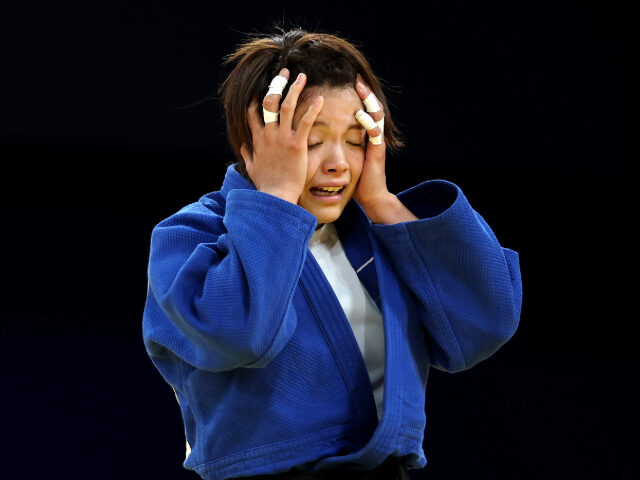The Japanese Olympic Committee (JOC) threatened to call the police and pursue other “legal action” on Thursday in response to “slanderous” online comments about its athletes at the 2024 Paris Summer Olympics, discouraging verbal abuse and urging the public not to add to athletes’ “anxiety and fear.”
“We would like everyone who supports the athletes to also think about the paths they have taken to get here, watch over their moments (of competition), and cheer them on,” the JOC’s statement read, according to a translation by Japan’s Mainichi Shimbun newspaper. “Your messages of encouragement and support over social media have been a great source of strength for athletes, coaches, and managers. But at the same time, thoughtless slander and criticism can not only be hurtful but also cause anxiety and fear.”
The JOC statement noted that the Japanese athletes themselves respected and supported their opponents when appropriate and urged the Japanese people to behave similarly to all athletes, citing examples such as Japanese athletes urging crowds to quiet when their opponents were performing.
The JOC said it would “consider calling the police and legal actions” against “insults and intimidation,” without elaborating.
The statement did not clarify what kind of police action — beyond calls — the JOC would pursue or if it would exclusively involve Japanese authorities, given the possibility that an online heckler could be writing from anywhere in the world. Japan already boasts robust laws against defamation but updated its legal code in May to demand that social media platforms “set up points of contact for accepting deletion requests and disclose criteria for removing posts, among other measures,” according to Japan’s Kyodo News. The amendments to the defamation law followed the high-profile suicide of reality television star and wrestler Hana Kimura in 2020, who published multiple statements before her suicide, lamenting a barrage of online insults and cyberbullying.
“In disturbing tweets that have since been deleted and translated, Kimura alluded to suffering from online bullying and wrote that she did not ‘want to be a human anymore’ and ‘wanted to be loved,’” USA Today reported at the time.
The JOC published its statement after several of its athletes were the subjects of reportedly abusive posts on social media, which caused concern for the athletes’ mental health and potential effects on their performances. Kyodo News reported that race walker Ayane Yanai, who chose not to compete in an individual race, was among those affected.
“Harsh words from many people have hurt me,” she told reporters, without elaborating.
“Judoka Uta Abe has been criticized for breaking down in a flood of tears following her second-round loss in the 52-kilogram category,” Kyodo further observed.
In its coverage of the JOC statement, the Japan Times reported that a former Olympic swimmer, Tomoko Hagiwara, published a message online on Sunday recalling similar attacks on her character as far back as the 2000 Sydney Summer Olympics.
“Only a handful will make it to the finals, and only a handful will win a medal,” she wrote. “No athlete wants to perform badly. They deserve applause for overcoming anxiety and fear to compete on the world stage. Before you hit post, try putting yourself in their shoes.”
Tokyo hosted the last edition of the Summer Olympics in 2021. The research organization World Athletics published a study on internet abuse against Olympians following those Games, finding “disturbing levels of abuse of athletes, including sexist, racist, transphobic, and homophobic posts and unfounded doping accusations.” The abuse disproportionately targeted women and girls — “female athletes were the target of 87% of all abuse,” even though they represented 69 percent of athletes targeted at all.
It continued, “63% of identified abuse was directed at just two athletes — both black and female — while the two most common categories of abuse were of a sexist (29%) and/or racist (26%) nature, accounting for 55% of all identified abuse.” It did not name the two athletes in question.
The International Olympic Committee (IOC) addressed the potential of online insults against athletes in May, two months before the Games, by announcing the implementation of an artificial intelligence (AI) system to monitor “all major social media platforms” for content the IOC found inappropriate.
“Any identified threats will be flagged so that abusive messages can be dealt with effectively by the relevant social media platforms — in many cases before the athlete has even had the chance to see the abuse,” the IOC said in a statement announcing the program. The IOC boasted that the AI system would monitor comments about 15,000 athletes and more than 2,000 officials related to the Paris Games, both Olympians and Paralympians.
In addition to the AI surveillance program, the IOC announced that it would allow each country to send “registered and nationally certified mental health practitioners” to the Paris Games to serve athletes seeking help, and the IOC itself would provide them with “educational materials and other information regarding harassment and abuse in sport.”
As of Friday, Japan is tied for sixth place with Italy in the total medal count, bringing home 17 medals. Japanese athletes have won eight gold medals so far.

COMMENTS
Please let us know if you're having issues with commenting.